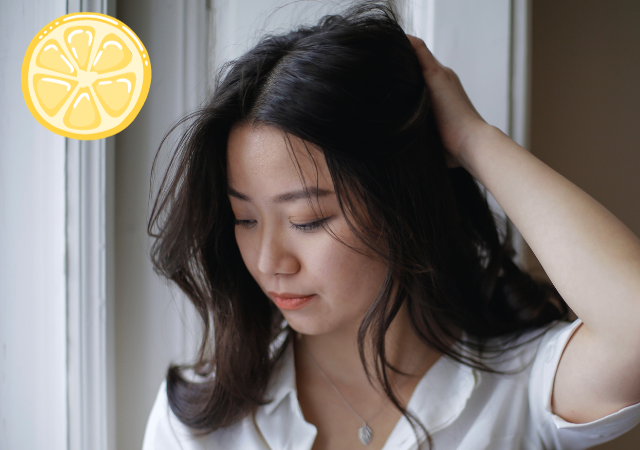Can We Apply Lemon Juice Directly on the Scalp for Treating Dandruff?
Introduction
Dandruff, a common scalp condition, can be an annoying and embarrassing problem for many. While there is a plethora of products and home remedies claiming to alleviate this issue, one natural remedy that has gained attention is lemon juice. The tangy and refreshing citrus fruit has long been celebrated for its myriad of health benefits, including its antimicrobial and antifungal properties. But can we apply lemon juice directly on the scalp for treating dandruff?
In this article, we will delve into the world of dandruff, exploring its causes and conventional treatments. We will then shift our focus to lemon juice, examining its natural properties and how it is believed to combat dandruff. While the idea of using lemon juice as a remedy may sound appealing, it’s essential to understand the potential benefits, precautions, and scientific evidence surrounding this approach. So, let’s embark on this journey to discover whether lemon juice can be a simple and effective solution for dandruff woes.
-
Understanding Dandruff

Before we dive into the lemon juice remedy, it’s crucial to understand dandruff itself. Dandruff, medically known as seborrheic dermatitis, is a chronic condition that causes the scalp to become dry, itchy, and flaky. While it is not a severe health concern, it can be both uncomfortable and embarrassing due to the visible flakes it produces.
Causes of Dandruff
The exact cause of dandruff is not fully understood, but several factors contribute to its development:
- Malassezia: A type of yeast that naturally lives on the scalp, Malassezia overgrowth is often associated with dandruff.
- Sebum (Skin Oil): An excess of sebum can lead to the accumulation of dead skin cells, contributing to dandruff.
- Dry Skin: Dry skin, particularly in cold or dry weather, can cause flaking and itching.
- Hygiene and Hair Care: Infrequent washing of hair, using harsh hair products, or improper rinsing can all play a role in dandruff.
- Diet and Stress: While these factors are less understood, some believe that diet and stress can influence dandruff.
-
Conventional Treatments for Dandruff
Before exploring natural remedies like lemon juice, it’s essential to recognize conventional treatments for dandruff:
- Anti-Dandruff Shampoos: These shampoos contain active ingredients like pyrithione zinc, ketoconazole, selenium sulfide, or coal tar, which can effectively reduce dandruff symptoms.
- Medicated Shampoos: Prescription shampoos with stronger formulations may be recommended by a dermatologist for severe cases of dandruff.
- Regular Hair Washing: Keeping the scalp clean through regular hair washing can help prevent dandruff.
- Scalp Moisturization: Using a suitable scalp moisturizer can alleviate dryness and itching.
Now that we have a basic understanding of dandruff, let’s explore whether lemon juice can be a natural remedy for this common scalp condition.
-
Lemon Juice and Dandruff: The Natural Approach

Lemon juice has garnered attention for its various health benefits, thanks to its rich vitamin C content and natural acidity. When it comes to dandruff, proponents of this remedy believe that the acidity of lemon juice can help balance the scalp’s pH, reduce oiliness, and inhibit the growth of Malassezia yeast – all of which are factors associated with dandruff.
How Lemon Juice is Believed to Work Against Dandruff
- Balancing pH: The natural acidity of lemon juice is thought to help balance the pH level of the scalp, creating an environment less conducive to the growth of dandruff-causing microbes.
- Antifungal Properties: Lemon juice contains citric acid, which is believed to have antifungal properties that can combat the overgrowth of Malassezia yeast.
- Exfoliation: Lemon juice can help exfoliate dead skin cells from the scalp when massaged in gently.
-
Precautions and Potential Risks
While lemon juice holds promise as a natural remedy for dandruff, it’s essential to exercise caution when using it directly on the scalp. Here are some precautions and potential risks to consider:
- Skin Sensitivity: Lemon juice is acidic, which can cause irritation and burning sensations on the scalp, particularly if you have sensitive skin or open wounds.
- Dryness: Overuse of lemon juice can lead to excessive dryness of the scalp, exacerbating dandruff symptoms.
- Allergies: Some individuals may be allergic to lemon juice, which can result in skin reactions like itching, redness, or hives.
- Sun Sensitivity: Lemon juice can make your skin more sensitive to sunlight. If you use it on your scalp, take care to protect your head from excessive sun exposure.
-
Applying Lemon Juice to the Scalp

If you decide to try lemon juice as a dandruff remedy, it’s essential to do so cautiously. Here’s a step-by-step guide on how to apply lemon juice directly to the scalp:
Step 1: Gather Your Ingredients
You’ll need fresh lemons and a small bowl for this method.
Step 2: Extract Lemon Juice
Cut the lemon in half and squeeze the juice into the bowl. Remove any seeds.
Step 3: Dilution (Optional)
You can dilute the lemon juice with water to reduce its acidity. A common ratio is 1 part lemon juice to 2 parts water.
Step 4: Application
- Dampen your hair and scalp slightly.
- Using a cotton ball or your fingertips, apply the diluted or undiluted lemon juice directly to your scalp.
- Gently massage it into your scalp for a few minutes.
- Leave it on for 5-10 minutes.
Step 5: Rinse Thoroughly
Wash your hair with a mild shampoo to remove the lemon juice entirely. Make sure there is no residue left, as it can lead to further scalp irritation.
Frequency and Duration of Treatment
You can repeat this process once or twice a week, depending on your scalp’s sensitivity and how it responds to the treatment. It’s crucial not to overdo it, as excessive lemon juice application can lead to dryness and irritation.
Tips for Optimizing the Application Process
- Always perform a patch test on a small area of your scalp before applying lemon juice to ensure you don’t experience an adverse reaction.
- Use freshly squeezed lemon juice rather than bottled lemon juice, which may contain preservatives.
- If you experience any burning or discomfort during the application, rinse the lemon juice off immediately.
-
Potential Benefits of Using Lemon Juice
So, what potential benefits can you expect from using lemon juice to treat dandruff? While individual results may vary, here are some of the benefits reported by users:
- Reduction in Dandruff Symptoms: Many individuals report a reduction in itching and flakiness after using lemon juice.
- Improved Scalp Health: Lemon juice’s natural acidity may help maintain a healthy pH balance on the scalp, preventing dandruff recurrence.
- Natural and Cost-Effective Remedy: Lemon juice is readily available and relatively inexpensive compared to commercial dandruff treatments.
-
Scientific Evidence: What Does Research Say?
While anecdotal evidence suggests that some people have found relief from dandruff by using lemon juice, scientific studies on its efficacy are limited. It’s important to approach lemon juice as a complementary or supplementary remedy rather than a standalone solution for dandruff. If you have a severe or persistent dandruff problem, consult a dermatologist for more effective treatment options.
Precautions and Considerations
As with any natural remedy, it’s essential to be aware of potential risks and considerations when using lemon juice for dandruff:
1. Skin Sensitivity: Individuals with sensitive skin may experience irritation when using lemon juice. Always perform a patch test before applying it to your entire scalp.
2. Potential Side Effects: Lemon juice can cause a burning sensation, redness, or dryness in some individuals. Discontinue use if you experience any adverse reactions.
3. Interaction with Other Hair Care Products: Be cautious when using lemon juice in conjunction with other hair care products, as it may lead to unpredictable outcomes.
-
Alternatives to Lemon Juice
If lemon juice doesn’t provide the desired results or if you’re concerned about potential risks, several alternative natural remedies and commercial dandruff treatments are worth exploring:
- Tea Tree Oil: Tea tree oil is known for its antifungal properties and is a common ingredient in anti-dandruff shampoos.
- Aloe Vera: Aloe vera’s soothing properties can help alleviate itching and inflammation on the scalp.
- Apple Cider Vinegar: Diluted apple cider vinegar can be used as a scalp rinse to restore pH balance and reduce dandruff.
- Commercial Dandruff Shampoos: Over-the-counter and prescription dandruff shampoos contain active ingredients designed to combat dandruff effectively.
Conclusion
In the quest to find effective remedies for dandruff, the use of lemon juice directly on the scalp is a natural and cost-effective option that some individuals have found beneficial. However, it’s important to exercise caution, perform a patch test, and be mindful of potential risks and side effects.
While lemon juice may provide relief for mild dandruff, severe or persistent cases may require more potent treatments. If you’re unsure about the best approach for your dandruff, or if it worsens despite home remedies, consult a dermatologist for personalized guidance and treatment options. Remember that maintaining a clean and healthy scalp is essential for dandruff prevention, and lemon juice can be one of the tools in your arsenal to achieve this goal.

My name is Rohit Vagh and I’m a content writer specializing in fashion and lifestyle. I have three years of experience in this field and have written various articles. My writing style is creative and engaging, and I strive to create content that resonates with my readers. I have a deep passion for fashion and am constantly researching the latest trends and styles to make sure my readers are up to date. I’m excited to continue my career in blogging, and I’m always looking for new opportunities in the fashion and lifestyle space.





